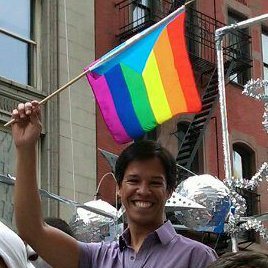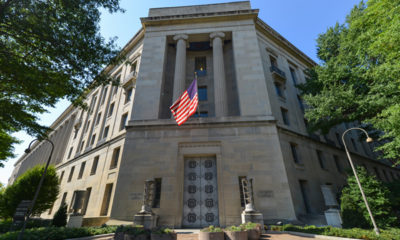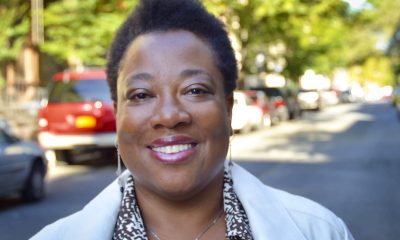National
Puerto Rico police agree to strengthen hate crime response
The Justice Department announced agreement to reform the department on Dec. 21

DOJ ordered the PRPD to “collect accurate and reliable data hate crimes” on “an ongoing basis” and submit it to the Federal Bureau of Investigation for inclusion in its annual Hate Crimes Statistics report. (The FBI currently reports statistics based on sexual orientation, but not gender identity and expression. It will begin to collect transgender-specific data this year as outlined in the Matthew Shepard and James Byrd, Jr., Hate Crimes Prevention Act that President Obama signed in 2009. The agency will begin to report them in 2014.)
The department agreed to develop policies that will improve the way its officers interact with transgender people while in custody. The PRPD will also provide officers with bias-free police trainings at least every two years and annually after 2017. Components of these sessions will include “the protection of civil rights as a central part of the police mission” and “arbitrary classifications and stereotyping” based on sexual orientation, gender identity and expression and other factors.
“These provisions are designed to promote police services that are equitable, respectful, and free of unlawful bias in a manner that supports broad community engagement and effective crime prevention,” the agreement reads. “These provisions will enable PRPD to provide members of the public with equal protection of the law, without bias based on race, color, ethnicity, national origin, religion, gender, disability, sexual orientation, gender identity or gender expression.”
“We appreciate the hard work of [then-Gov. Luís] Fortuño, [PRPD] Superintendent Hector Pesquera and their staff,” Thomas E. Perez, assistant attorney general for the DOJ Civil Rights Division, said in a press release that announced the agreement. “Together, and with great input from the public, we have designed a comprehensive blueprint for reform that provides a solid foundation that will professionalize and support the hardworking men and women of PRPD as they protect the people of Puerto Rico.”
The DOJ’s announcement comes after its damning Sept. 2011 report that listed an inadequate response to hate crimes as among the PRPD’s numerous deficiencies.
More than 30 LGBT Puerto Ricans have been killed since gay teenager Jorge Steven López Mercado’s decapitated, dismembered and partially burned body was found alongside a remote roadside in Nov. 2009.
A judge sentenced Juan José Martínez Matos to 99-years in prison after he pledged guilty to the crime, but the Puerto Rico Department of Justice’s own reports indicate Puerto Rican prosecutors have yet to convict anyone under the island’s hate crimes law that includes both sexual orientation and gender identity and expression. The Puerto Rico Senate in late 2011 approved a proposal that would have eliminated LGBT-specific protections from the aforementioned statute.
Pedro Julio Serrano and other Puerto Rican LGBT advocates repeatedly criticized Fortuño and his administration for what they contend was an unwillingness to speak out against anti-LGBT violence in the American commonwealth in the wake of López’s brutal death that sent shockwaves across the island and around the world.
“It’s definitely too little too late for the outgoing administration,” Serrano told the Washington Blade in response to the DOJ agreement. “But it’s a good blueprint and protocol that is necessary to finally have this in place for the prosecutors in Puerto Rico so they can work on the hate crimes on the island and make sure they are correctly prosecuted and investigated as hate crimes because it hasn’t happened in Puerto Rico.”
The DOJ also met with Gov. Alejandro García Padilla, who succeeded Fortuño on Wednesday, to discuss the agreement.
“We look forward to working with Governor-elect García Padilla and his incoming administration to finalize the agreement and begin the critical work of rebuilding PRPD,” Perez said before the current governor took office. “Ensuring effective, constitutional policing is not a partisan issue, and we appreciate the commitment of Gov. Fortuño and Governor-elect García Padilla to the reforms embodied in the agreement. The successful implementation of the reforms contained in this agreement will help to reduce crime, ensure respect for the Constitution and restore public confidence in PRPD.”
García pledged during his campaign he would support a number of LGBT-specific proposals that include the addition of sexual orientation and gender identity and expression to the island’s anti-employment discrimination law, civil unions for same-sex couples and including LGBT Puerto Ricans in the island’s domestic violence statutes. Serrano urged the incoming administration to amend the hate crimes law to allow prosecutors to introduce bias-related evidence at the start of a trial as opposed to during the sentencing phase.
“We want it from the get go to be prosecuted as a hate crime so the evidence and a way the case is prosecuted is a following the motivation of the crime and it’s not left to the end of the process where usually after they get a conviction or someone pleads guilty then they don’t have to deal the motivation because they already got what they wanted,” he said, adding he feels both the PRPD and the Puerto Rico Justice Department do not understand how to address hate crimes. “The only way to curb anti-LGBT violence in Puerto Rico is we finally prosecute these as hate crimes and people understand the motivation behind them was anti-LGBT.”
The DOJ agreement will take effect on April 15.
U.S. Supreme Court
Concern over marriage equality in US grows two decades after first Mass. same-sex weddings
Gay and lesbian couples began to marry in Bay State in 2004

Two decades after Massachusetts became the first state to legalize same-sex marriage, a new study reveals both significant progress and ongoing challenges for married LGBTQ couples in the U.S., with a growing sense of insecurity about the future of their rights.
The Williams Institute at UCLA School of Law surveyed 484 married same-sex couples from all 50 states and D.C. The study, released Monday, marks the 20th anniversary of legal same-sex marriage in the U.S.
Researchers found that 93 percent of respondents cited love as a primary reason for marrying, with 75 percent also mentioning legal protections. Over 83 percent reported positive changes in their sense of security, and 74.6 percent noted improved life satisfaction since marrying.
However, the study also highlighted persistent discrimination and growing concerns about the future. About 11 percent of couples who had a wedding reported facing prejudice during the planning process.
Alarmingly, nearly 80 percent of respondents expressed concern about the potential overturning of the 2015 Obergefell v. Hodges decision, which legalized same-sex marriage nationwide. This anxiety has been exacerbated by initiatives like Project 2025, a conservative policy blueprint that some fear could roll back LGBTQ rights if implemented.
The possibility of a former President Donald Trump victory in the upcoming election has further intensified these concerns. Many respondents cited Trump’s previous U.S. Supreme Court appointments and his statements on LGBTQ issues as reasons for their apprehension. One participant stated, “The thought of another Trump presidency keeps me up at night. We’ve come so far, but it feels like our rights could be stripped away at any moment.”
The current political climate has 29 percent of respondents considering moving to another state, with 52.9 percent citing socio-political concerns as a primary reason. This reflects a growing sense of insecurity among LGBTQ couples about their rights and freedoms.
Brad Sears, founding executive director of the Williams Institute, noted, “The data clearly show that marriage equality has had a profound positive impact on same-sex couples and their families. However, it also reveals ongoing challenges and serious concerns about the future of these rights in light of current political trends and the upcoming election.”
Christy Mallory, legal director at the Williams Institute and lead author of the study, added, “This research provides crucial insights into the lived experiences of same-sex couples two decades after marriage equality began in the U.S. The high level of concern about potential loss of rights underscores the continued importance of legal protections and public support for LGBTQ+ equality.”
The study found that 30 percent of surveyed couples have children, with 58.1 percent of those parents reporting that marriage provided more stability for their families. However, many of these families now worry about the security of their legal status in the face of potential policy changes and shifting political landscapes.
As the nation reflects on two decades of marriage equality, the study underscores both the transformative power of legal recognition and the ongoing need for vigilance in protecting LGBTQ+ rights. The findings highlight the complex reality faced by same-sex couples in America today: Celebrating hard-won progress while grappling with uncertainty about the future, particularly in light of upcoming political events and potential shifts in leadership.
State Department
State Department hosts meeting on LGBTQ rights and foreign policy
Event took place before Pride Month reception

Secretary of State Antony Blinken on Thursday hosted a group of LGBTQ activists and politicians from around the world at the State Department.
The event — described as a “Convening on U.S. Foreign Policy: National Security, Inclusive Development, and the Human Rights of LGBTQI+ Persons” — took place before the State Department’s annual Pride Month reception. Participants included:
• Jessica Stern, the special U.S. envoy for the promotion of LGBTQ and intersex rights
• U.S. Ambassador to the U.N. Linda Thomas-Greenfield
• U.S. Trade Representative Katherine Tai
• U.S. Ambassador to India Eric Garcetti
• Suzanne Goldberg, senior advisor to the Under Secretary of State for Civil Security, Democracy, and Human Rights
• Under Secretary of State for Civilian Security, Democracy, and Human Rights Uzra Zeya
• U.S. Agency for International Development Senior LGBTQI+ Coordinator Jay Gilliam
• USAID Counselor Clinton D. White
• National Security Council Senior Director for Democracy and Human Rights Kelly Razzouk
• Assistant U.S. Secretary of Health Adm. Rachel Levine
• National Security Council Human Rights Director Jess Huber
• U.N. Assistant Secretary General for Human Rights Ilze Brandt Kehris
• Icelandic Ambassador to the U.S. Bergdís Ellertsdóttir
• Council for Global Equality Co-Executive Director Mark Bromley
• Outright International Senior Advisor for Global Intersex Rights Kimberly Zieselman
• Essy Adhiambo, executive director of the Institute for Equality and Non Discrimination in Kenya
• Pau González, co-chair of Hombres Trans Panamá and PFLAG-Panamá
“Forty-five years ago, thousands gathered in D.C. in what became the first national march for LGBTQI+, demanding their voices be heard,” said Thomas-Greenfield in a post to her X account that showed her speaking at the event. “We must continue to carry forward the spirit of these pioneers and fight for equal rights and dignity for all.”
Forty-five years ago, thousands gathered in DC in what became the first national march for LGBTQI+, demanding their voices be heard.
We must continue to carry forward the spirit of these pioneers and fight for equal rights and dignity for all. 🏳️🌈🏳️⚧️ pic.twitter.com/oph2Ahmfhq
— Ambassador Linda Thomas-Greenfield (@USAmbUN) June 28, 2024
President Joe Biden in 2021 signed a memo that committed the U.S. to promoting LGBTQ and intersex rights abroad as part of his administration’s overall foreign policy.
“LGBTQI+ rights are human rights,” said Blinken. “Our government has a responsibility to defend them, to promote them — here and everywhere.”
Blinken noted consensual same-sex sexual relations remain criminalized in 64 countries, with the death penalty in 11 of them.
He specifically highlighted Uganda’s Anti-Homosexuality Act and Hungarian Prime Minister Viktor Orbán’s government’s “smearing scapegoating, stigmatizing LGBTQI+ persons — vilifying them with degrading labels, denying them equal rights, normalizing violence against them.” (Gay U.S. Ambassador to Hungary David Pressman this month marched in the annual Budapest Pride parade.)
Blinken noted Iraqi MPs earlier this year “passed legislation that punishes same-sex relations with up to 15 years in prison.” He also pointed out that Indonesian lawmakers approved a new criminal code banning extramarital sex.
“In a nation where same-sex couples cannot marry, these laws effectively make all same-sex conduct illegal and they undermine privacy for all Indonesians,” said Blinken.
“We’re defending and promoting LGBTQI+ rights around the world,” he said.
Blinken noted seven countries — Barbados, St. Kitts and Nevis, Antigua and Barbuda, Dominica, Namibia, Singapore, the Cook Islands — have decriminalized consensual same-sex sexual relations over the last two years. He also highlighted Greece, Liechtenstein, and Thailand this year extended marriage rights to same-sex couples, and other countries are banning so-called “conversion therapy.”
“These achievements are possible because of incredibly courageous human rights defenders and government partners on the ground, but I believe America’s support is indispensable,” said Blinken. “When we engage — sometimes publicly, sometimes privately, sometimes both — when we share our own knowledge and experience, we can and we do achieve change.”
Blinken also announced the U.S. now considers sexual orientation and gender identity are part of the International Covenant on Civil and Political Rights that took effect in 1976.
“This is one of the key treaties committing nations to upholding universal rights,” he said.
“In our regular reporting to the council on human rights, we will continue to include incidents of discrimination or abuse committed against LGBTQI+ persons, now with the clear framework of this well-supported interpretation,” added Blinken. “That will further empower our efforts.”
Blinken reiterated this point and the Biden-Harris administration’s commitment to the promotion of LGBTQ and intersex rights abroad when he spoke at the State Department’s Pride Month event.
“Defending, promoting LGBTQI+ rights globally is the right thing to do, but beyond that, it’s the smart and necessary thing to do for our country, for our national security, for our well-being,” he said.
The White House
Jill and Ashley Biden headline White House Pride celebration
First lady celebrated historic pardons of LGBTQ veterans

First lady Jill Biden and the president and first lady’s daughter, Ashley Biden, headlined the White House Pride celebration on the South Lawn on Wednesday, followed by a performance by singer and actress Deborah Cox.
“My dad has built the most pro-equality administration” in history, Ashley Biden said, crediting the work of LGBTQ people of color like Marsha P. Johnson, a prominent figure in the Stonewall uprising of 1969, as well as “so many of you [who] have continued to lead their fearless fighting against against injustice here and around the world.”
She introduced her mother as “the woman who taught me to be myself up showed me in so many ways how I can make a difference” and who “works every single day, tirelessly, to ensure that all people have the opportunities and freedoms that they deserve.”
“I hope that all of you feel that freedom and love on the South Lawn today,” Jill Biden said.
Her remarks were briefly interrupted by a protestor’s chants of “no Pride in genocide,” which was drowned out by chants of “four more years.”
The first lady noted how many of the attendees came “here from states that are passing laws targeting LGBTQ Americans.”
“There are those who see our communities and our families and wish to tear them down,” she said, “those who can’t see that the world is so much bigger and [more] beautiful than they know — but when our homes are threatened, when they strip away our rights, and deny our basic humanity, we say, ‘not on our watch.'”
“Pride is a celebration, but it is also a declaration,” the first lady said, highlighting the U.S. Supreme Court’s ruling in Obergefell v. Hodges nine years ago, which established marriage equality as the law of the land.
She then credited the accomplishments of the Biden-Harris administration on matters of LGBTQ rights, including the repeal of the previous administration’s ban on military service by transgender servicemembers and the FDA’s loosening of restrictions on blood donation by gay and bisexual men.
The first lady also celebrated the president’s announcement earlier on Wednesday that he will pardon LGBTQ veterans who were discharged and court martialed because of their sexual orientation or gender identity.
“We will never stop fighting for this community,” she said.

-

 Canada2 days ago
Canada2 days agoToronto Pride parade cancelled after pro-Palestinian protesters disrupt it
-

 Theater5 days ago
Theater5 days agoStephen Mark Lukas makes sublime turn in ‘Funny Girl’
-

 Baltimore4 days ago
Baltimore4 days agoDespite record crowds, Baltimore Pride’s LGBTQ critics say organizers dropped the ball
-

 Sports4 days ago
Sports4 days agoHaters troll official Olympics Instagram for celebrating gay athlete and boyfriend












